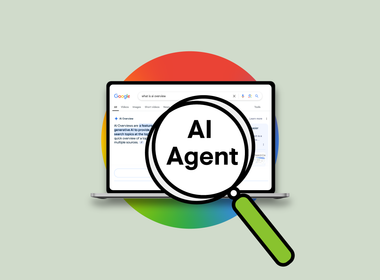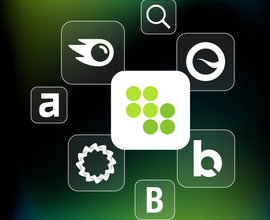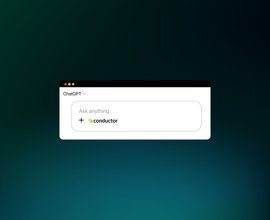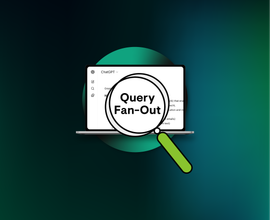What is an AI Agent and How Does it Work?
So what exactly are AI agents, and why are they suddenly so important? For brands, understanding AI agents is essential for navigating the future of digital strategy and unlocking new levels of efficiency and growth.
What is an AI agent?
An AI agent is a system designed to understand its environment, make decisions, and take actions autonomously to achieve specific objectives. Unlike traditional AI models and chatbots that might perform a single task or respond to a direct prompt, an AI agent can complete a multi-step workflow, adapting its approach based on real-time feedback and its understanding of the goal.
Think of an AI agent as a digital assistant with a high degree of independence. It’s not just a tool that executes commands; it’s a system that can understand a high-level goal, break it down into smaller tasks, plan a sequence of steps, execute those actions, and even learn from its experiences to improve future performance.
Key characteristics that define an AI agent include:
- Autonomy: The ability to operate independently without constant human intervention.
- Perception: The capacity to gather and interpret information from the environment.
- Action: The capability to execute decisions and influence its environment.
- Goal-orientation: A clear objective or set of objectives that guides behavior.
- Learning: Often, AI agents can learn from their experiences, improving their performance over time.
An AI agent is a system that uses AI to work autonomously. You build an AI agent to do a job, so when you ask it to do something, you don’t have to give it a lot of direction, because it knows what job it needs to do in the process, and it’s really good at that job.
Why is agentic AI important?
Agentic AI is a huge leap forward because it addresses one of the biggest challenges in leveraging AI: the need for continuous human guidance for complex tasks. By enabling AI systems to operate with more freedom, agentic AI can help drive improved efficiency and productivity.
For marketers, this means the possibility to automate entire workflows that used to be tedious and resource-heavy. From scheduling and sending email campaigns to generating high-quality content at scale, agentic AI can free up resources to focus on higher-level needs and key business goals.
What does it mean to be agentic?
At its heart, the term agentic in AI contexts refers to an AI's ability to act autonomously, pursue specific goals, and make decisions independently. It represents a shift from AI that simply responds to prompts (like AI answer engines) or follows pre-set rules, to AI that can initiate, plan, and execute complex sequences of actions to achieve an objective.
There are different levels to agentic workflows in the context of the degree of autonomy the AI takes in making decisions and performing tasks.
While an AI agent might be a component within a larger system, designed to perform a specific function, agentic speaks to agency and the power to act and produce a result.
Agentic means that you are using multiple agents, or, you know, you use agents to complete a whole process where someone can have one agent takes care of this, another agent takes care of that, a third agent taking care of another task and you get the output and everything is done autonomously, and you just have to prompt it to start.
When assessing an AI system, ask yourself:
- Does it exhibit autonomy? Can the system initiate actions or make decisions on its own, without requiring a human to prompt every step? For example, a system that automatically adjusts website content based on real-time user engagement data, without manual triggers, demonstrates autonomy.
- Does it interact with its environment? Does the system actively gather information from its surroundings (whether digital data streams, user inputs, or physical sensors) and then perform actions that affect that environment? A system that monitors website performance metrics and then automatically adjusts server resources in response is interacting with its environment.
- Does it pursue flexible goals? Can the system adapt its approach or strategy to achieve a goal, even if the initial conditions change or unexpected obstacles arise? If a content optimization agent aims to improve search visibility for a specific topic, and the competitive landscape shifts, a true AI agent would adjust its content strategy rather than failing.
These factors help identify systems that leverage more than basic automation, showcasing how AI agents adapt.
One aspect where machines are behind humans is when you speak to somebody that you know, they know things about you. Usually, there's some kind of intrinsic memory that machines typically don’t have. So, having memory and having context is one of those signatures of an agentic.
Another signature is that they know what tools they have access to, and how they can perform tasks on behalf of humans. So, if you tell the agent that you're trying to accomplish XYZ, even without you specifying detailed steps about what it needs to do, it can determine next steps and execute those tasks.
AI Agents vs. chatbots vs. automation scripts
AI agent, chatbot, and automation script are often used interchangeably, but these terms represent distinct levels of intelligence and capability. It’s essential for brands to understand the differences to ensure they’re leveraging the right technology for the right task.
- Automation Script: This is the simplest form of automation. An automation script follows a predefined, rigid set of instructions. It executes tasks linearly and has no ability to perceive, reason, or adapt. For example, a script that automatically backs up files at a specific time each day is an automation script. It does exactly what it is told, nothing more, nothing less. It cannot respond to unexpected errors or learn from its past actions.
- Chatbot: A chatbot is primarily designed for conversations. It processes natural language input and generates responses, typically to answer questions or perform specific, limited tasks. Many chatbots are rule-based, meaning they follow a decision tree of predefined responses. A chatbot's main function is usually communication, and while it can perform some basic pre-programmed actions (like booking an appointment), its scope is usually conversational use cases. For instance, a customer service chatbot can answer frequently asked questions about a product. While it might understand variations of a question, it typically does not perceive a broader environment or pursue complex, multi-step goals on its own.
- AI Agent: An AI agent is much more sophisticated. It has the ability to perceive, reason, act, and often learn. Unlike a chatbot, an AI agent is not limited to conversation; its core purpose is to achieve goals by interacting with its environment. Unlike an automation script, it can adapt its behavior based on new information and learn from its experiences.
In short, the key differences between each are:
- Persistent learning: AI agents often incorporate machine learning to improve over time, something chatbots and automation scripts usually don’t.
- Task complexity: AI agents are designed to handle complex, multi-step tasks that may require dynamic decision-making.
- User input requirements: Automation scripts require precise, predefined inputs. Chatbots require conversational input. AI agents can often operate with less direct user input, making autonomous decisions based on their goals and perceptions.
ChatGPT is a component that an AI agent might use for its reasoning or communication capabilities. An AI agent built with ChatGPT could use its language understanding to interpret user requests, then leverage other tools and its own decision-making logic to perform actions like scheduling a meeting, researching a topic, or optimizing a website.
Common examples of agentic workflows
AI agents are transforming how businesses operate, from enhancing customer experiences to streamlining complex workflows. Here are some common industries and emerging trends where AI agents are making a significant impact:
- Customer support: AI agents are revolutionizing customer service by handling routine inquiries, providing instant answers to frequently asked questions, and routing complex issues to human agents. This frees up human teams to focus on more nuanced problems, improving efficiency and customer satisfaction. For example, an AI agent can quickly resolve a password reset request or provide tracking information for an order, available 24/7.
- Marketing and sales: In marketing, one use case for AI agents is to generate personalized content, qualify leads, and automate campaign optimization. They can analyze tons of customer data to identify patterns, predict behavior, and tailor marketing messages for maximum impact. An AI agent might identify a high-value lead based on their website activity, then automatically create a personalized email sequence to nurture that lead.
- Data analysis and business intelligence: AI agents excel at automating data collection, identifying trends, and generating actionable insights from large datasets. An AI agent can continuously monitor market trends, competitor activities, and internal performance metrics, providing real-time reports and flagging anomalies.
- eCommerce: AI agents enhance the online shopping experience through personalized product recommendations, dynamic pricing adjustments based on demand and inventory, and efficient inventory management. An AI agent might analyze a shopper's browsing history and purchase patterns to suggest relevant products, increasing conversion rates.
- Healthcare: From assisting with diagnostics to personalizing treatment plans and accelerating drug discovery, AI agents are critical in healthcare as well. They can analyze medical images, patient records, and research papers to provide insights that support medical professionals.
- Finance: AI agents are deployed for fraud detection, algorithmic trading, and providing personalized financial advice. They can monitor transactions in real-time to identify suspicious activities or execute trades based on complex market analysis.
- Manufacturing: In manufacturing, AI agents contribute to predictive maintenance (identifying equipment failures before they occur), quality control, and optimizing supply chain logistics. An agent might monitor sensor data from machinery to predict when maintenance is needed, reducing downtime.
- Web optimization: For SEOs, content marketers, and web teams, AI agents can automate keyword research, identify content gaps, optimize on-page elements, and monitor website performance for technical issues.
Research is the number one use case right now. A lot of people are building agents so that they can have them perform research on XYZ topic. You might have an agent dedicated to a specific competitor for competitive research. Or you might have an agent, and their only job is to look at traditional search metrics and then they make plans based on that, or build content.
Conductor, for example, leverages purpose-built AI to provide intelligent recommendations for content optimization and real-time website monitoring, helping teams maximize their organic search visibility and protect their digital growth. This allows teams to focus on strategic initiatives rather than manual, repetitive tasks.
Are there risks to using AI agents?
As AI agents become more autonomous and capable, critical questions arise regarding their impact on human values and societal well-being. Striking a balance between the benefits of automation and the preservation of human control, fairness, and transparency will only grow more important.
- Transparency: It is crucial to understand how AI agents make decisions. Black box AI systems, where the reasoning process is unclear, can lead to distrust and make it difficult to identify and correct errors or biases.
- Fairness: AI agents learn from data, and if that data contains historical biases, the agents can perpetuate or even amplify those biases.
- Accountability: When an AI agent makes a mistake or causes harm, who is responsible? Establishing clear lines of accountability is essential for building trust and managing risk.
- Human-in-the-loop strategies: While autonomy is a key benefit of AI agents, complete autonomy isn’t always for the best. Human-in-the-loop approaches ensure that human oversight and intervention are maintained. This allows humans to provide strategic guidance, correct errors, and make final decisions in complex or sensitive situations.
Before leveraging an AI agent, ask yourself these questions:
- What problem are we solving with this AI agent?
- How will we monitor its performance and ensure it aligns with our values and business goals?
- What are the potential unintended consequences or risks to our brand associated with deploying this agent?
- How will we ensure transparency in the agent's decision-making process?
- How will we maintain appropriate human oversight and control?
- What data will the agent use, and how will we ensure its quality, privacy, and ethical sourcing?
- How will we train our teams to work effectively alongside AI agents?
By proactively addressing these questions, organizations can harness the transformative power of AI agents while upholding ethical standards and ensuring beneficial outcomes
Empowering your digital strategy with AI agents
AI agents represent a significant leap forward in artificial intelligence, moving beyond simple automation to intelligent, goal-driven systems that perceive, reason, act, and learn. From streamlining customer support and personalizing marketing efforts to optimizing complex data analysis and enhancing website performance, their applications are vast and growing.
For digital marketing leaders, SEOs, content marketers, web teams, and eCommerce professionals, understanding AI agents is not just an academic exercise. It is about recognizing the tools that can drive unprecedented efficiency, unlock new growth opportunities, and future-proof your digital strategy in an increasingly AI-driven world. By focusing on their goals, behaviors, and impact, anyone can identify, understand, and strategically evaluate AI agent technologies to empower their teams and transform their digital presence.
FAQs
- What is agentic search?
- What is a human-in-the-loop AI approach?
- What is AI visibility?
- What is AEO tool sprawl?

![Patrick Reinhart, VP, Services and Thought Leadership, [object Object]](https://cdn.sanity.io/images/tkl0o0xu/production/9bc72298b24ad01b732de4c3376f79546d20f81c-3542x3542.png?fit=min&w=100&h=100&dpr=1&q=95)
![Wei Zheng, Chief Product Officer, [object Object]](https://cdn.sanity.io/images/tkl0o0xu/production/dcfa62c0fe34ba0c31f910b818874cd160ad8839-3542x3542.png?fit=min&w=100&h=100&dpr=1&q=95)






